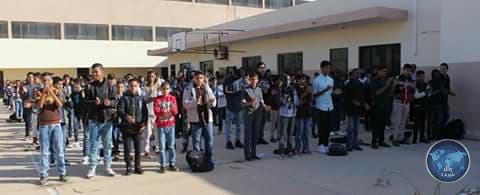
By Libya Herald reporters.
Benghazi/Tunis, 6 November 2017:
Almost two months late, hundreds of thousands of students started the academic year yesterday as kindergartens, primary and secondary schools across Libya finally reopened.
Teachers agreed a week ago to end their strike over pay and other benefits after the House of Representatives said there should be an increase and instructed a committee to decide on the amount by the end of November. An earlier proposal by the education ministry in Tripoli to award bonuses to teachers based on the number of classes they teach was rejected by them as being unfair to those who teach fewer classes, or none at all.
The delayed startup was marked by inspections by officials in a number of places. Schools in the Mashashia towns of Awinia and Zawia Al-Bagul had a visit from the education ministry’s undersecretary Adel Jumaa accompanied by an advisor to deputy Presidency Council head Ahmed Maetig. In the east, thousands turned up for classes. In Jalu, the figure was 6,000; in nearby Awjila the figure was put at 1,150. In Benghazi, almost all schools restarted.
The reopening has not been without its challenges. Teaches across the country say they still have not been able to access educational materials, notably for teaching English as well as such as science and mathematics. Education officials, however, say they hope to resolve the matter shortly.
Maintenance of schools is also a problem in many areas.
In a bid to improve efficiency, the undersecretary in the Beida-based education ministry (in effect the acting minister), Agub Abdullah Agub, instructed state schools not to run classes with less than ten students. He also told them not to accept foreign students unless they are officially resident in the country and brought to the school by family members.
There are some 517,000 teachers on the education ministry’s payroll although less than half actually teach. The issue is complicated by the fact that retired and out-of-work teachers remain on the payroll rather than being transferred to that of social services. They too want the increases — and the active teachers, looking to their future, want the principle maintained.







